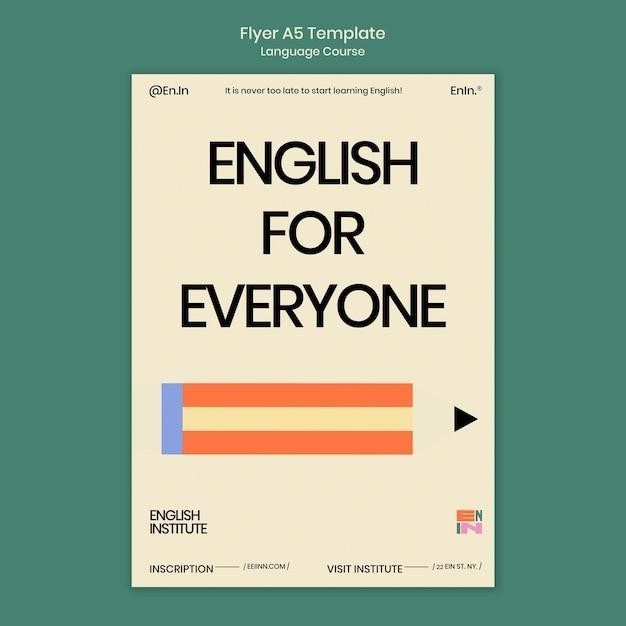
AQA GCSE English Language Revision Guide
This comprehensive guide provides all the essential information and resources you need to excel in your AQA GCSE English Language exams. Packed with expert advice, clear explanations, and practical strategies, this guide will help you master the skills required to achieve top marks. Explore the key concepts of both Paper 1⁚ Explorations in Creative Reading and Writing, and Paper 2⁚ Writers’ Viewpoints and Perspectives. Discover effective revision techniques, delve into language techniques, and gain insights into the key assessment objectives. With this guide, you’ll be equipped to confidently tackle the challenges of the AQA GCSE English Language exams and achieve your full potential.
Introduction
The AQA GCSE English Language exam is designed to assess your ability to understand, analyse, and evaluate a range of texts, as well as to produce your own creative and persuasive writing. It’s a challenging but rewarding qualification that can open doors to further study and a wide range of career paths. This revision guide will equip you with the knowledge and skills you need to succeed in the exam, helping you develop a deeper understanding of language and communication. We’ll cover the key concepts of both Paper 1⁚ Explorations in Creative Reading and Writing, and Paper 2⁚ Writers’ Viewpoints and Perspectives, providing you with a comprehensive overview of the exam structure, assessment objectives, and essential revision strategies. We’ll also explore the key language techniques used by writers, giving you the tools to analyse texts effectively. By following the advice and strategies outlined in this guide, you’ll be well-prepared to tackle the challenges of the AQA GCSE English Language exam with confidence and achieve your desired grade.
Paper 1⁚ Explorations in Creative Reading and Writing
Paper 1 of the AQA GCSE English Language exam focuses on your ability to engage with and interpret literary texts, as well as your creative writing skills. The paper is divided into two sections⁚ Section A⁚ Reading and Section B⁚ Writing. In Section A, you’ll be presented with an extract from a literary text and asked to answer four questions that assess your comprehension, analytical, and evaluative skills. These questions will focus on the writer’s use of language, structure, and themes. In Section B, you’ll have the opportunity to demonstrate your creative writing skills by responding to a stimulus, which could be a picture, a quotation, or a short piece of text. The writing task will require you to produce a piece of creative writing that demonstrates your ability to use language effectively, develop a compelling narrative, and engage the reader. By preparing thoroughly for Paper 1, you’ll be equipped to showcase your understanding of literary texts and your creative writing abilities.
Section A⁚ Reading
Section A of Paper 1 requires you to demonstrate your ability to analyze and interpret a literary text. You’ll be given an extract from a novel, and you’ll need to answer four questions that assess your comprehension, analytical, and evaluative skills. The first question will ask you to list four things from the extract, testing your ability to identify key details. The second question will focus on how the writer uses language to create a specific effect, requiring you to analyze word choice, imagery, and figurative language. The third question will explore the writer’s structural choices, asking you to identify and explain how elements like sentence structure, paragraphing, and punctuation contribute to the overall impact of the extract. Finally, the fourth question will ask you to present a personal response to the extract, drawing on your understanding of the text and your own interpretations. By practicing your reading comprehension, language analysis, and critical thinking skills, you’ll be well-prepared to tackle the challenges of Section A.
Section B⁚ Writing
Section B of Paper 1 is where you’ll showcase your creative writing skills. You’ll be presented with a writing task that will require you to produce a piece of imaginative writing based on a stimulus provided. The stimulus can range from a single word or phrase to a short extract or image, giving you the opportunity to explore a variety of genres and writing styles. It’s crucial to carefully consider the stimulus and develop a clear and original idea for your writing. Pay attention to the requirements of the task, ensuring your piece adheres to the specified genre, audience, and purpose. Remember to craft a compelling narrative, utilize descriptive language, and employ a range of writing techniques to create a memorable and impactful piece. Practice writing in different styles and genres to enhance your flexibility and creativity.
Paper 2⁚ Writers’ Viewpoints and Perspectives
Paper 2 delves into the world of non-fiction writing, focusing on how writers present their viewpoints and perspectives. You’ll be presented with two non-fiction texts, often from different genres, such as articles, speeches, or letters. Your task is to analyze the writers’ choices and how they use language, structure, and tone to convey their arguments and perspectives. This involves identifying key themes, comparing and contrasting the writers’ approaches, and critically evaluating their effectiveness. You’ll also need to demonstrate your understanding of the context of the texts and the intended audience. Preparation for Paper 2 involves honing your analytical skills, developing a strong understanding of non-fiction genres, and practicing your ability to articulate clear and well-supported interpretations.
Section A⁚ Reading
Section A of Paper 2 focuses on your ability to analyze and interpret two non-fiction texts. You’ll be presented with two extracts, often from different genres, such as articles, speeches, or letters. The questions will require you to demonstrate your understanding of the writers’ perspectives, arguments, and choices. You’ll need to identify key themes, analyze the writers’ use of language and structure, and compare and contrast their approaches. This section assesses your ability to read critically, identify implicit and explicit information, and synthesize evidence from the texts. You’ll need to demonstrate your understanding of how writers use language to persuade, inform, or entertain their audience, and how their choices contribute to the overall impact of their writing. Remember to back up your answers with evidence from the texts.

Section B⁚ Writing
Section B of Paper 2 requires you to craft a piece of extended writing in response to a specific prompt. You’ll be presented with a choice of writing tasks, each exploring a different genre, style, or purpose. These tasks might involve writing a persuasive speech, a news report, a blog post, or a formal letter. The key is to demonstrate your ability to adapt your writing style and structure to suit the task. You’ll be assessed on your understanding of the audience, purpose, and context, as well as your ability to use language effectively to create a compelling and engaging piece of writing. This section is all about showcasing your writing skills, creativity, and ability to communicate your ideas clearly and persuasively. Practice planning, drafting, and revising your work to ensure it meets the requirements of the task. Remember to use a range of language techniques to enhance your writing and engage your reader.
Essential Revision Tips
Effective revision for the AQA GCSE English Language exams requires a structured approach that combines active learning, practice, and self-assessment. Begin by understanding the exam structure and expectations for each paper. Create a detailed revision timetable, allocating dedicated time slots for each topic. Utilize past papers and mark schemes to familiarize yourself with the question types and assessment criteria. Focus on developing strong analytical skills, expanding your vocabulary, and mastering a variety of writing styles. Engage in active reading, annotating texts to identify key themes, language features, and structural elements. Practice answering questions under timed conditions to improve your speed and accuracy. Regularly review your progress, identifying areas of strength and weakness. Seek feedback from teachers or tutors to refine your understanding and improve your performance. Remember, effective revision is a continuous process that requires consistent effort and commitment.
Language Techniques
Understanding and recognizing language techniques is crucial for success in the AQA GCSE English Language exams. These techniques, employed by writers to convey meaning, evoke emotions, and engage readers, are essential for your analysis of both literary and non-literary texts. Familiarize yourself with common techniques such as similes, metaphors, personification, imagery, alliteration, and repetition. Learn to identify their purpose and effect within the context of the text. Consider how figurative language contributes to the overall message, tone, and atmosphere. Practice analyzing how writers use language to create specific effects, such as suspense, humour, or pathos. By mastering the art of identifying and interpreting language techniques, you’ll be able to provide sophisticated and insightful analysis in your exam responses, demonstrating your understanding of the writer’s craft.
Key Assessment Objectives
The AQA GCSE English Language exams assess your ability to demonstrate specific skills, outlined in the assessment objectives (AOs). AO1 focuses on your ability to identify and interpret information, both explicit and implicit, within texts. You’ll also need to select and synthesize evidence from different texts to support your analysis. AO2 requires you to analyze the language, structure, and form of texts, considering the writer’s choices and their impact on the reader. AO3 assesses your ability to evaluate and respond to texts, demonstrating your critical thinking and personal engagement with the material. AO4 focuses on your ability to communicate your ideas effectively in writing, using clear and accurate language, appropriate structure, and a range of vocabulary. Understanding these AOs is crucial for success in the exams. By familiarizing yourself with their specific requirements and practicing your skills accordingly, you’ll be well-prepared to demonstrate your understanding of English language and achieve your full potential.
Recommended Resources
To supplement your revision, consider exploring a range of resources beyond this guide. BBC Bitesize offers interactive revision materials and study guides specifically tailored for the AQA GCSE English Language exams. CGP’s Complete Revision & Practice book provides a comprehensive guide, practice questions, and exam-focused content. Save My Exams provides valuable revision notes and insights into the AQA GCSE English Language syllabus, covering both Paper 1 and Paper 2. For a more interactive approach, Seneca Learning provides bite-sized English Language quizzes designed to reinforce your knowledge and skills. Additionally, consider exploring past papers and mark schemes to familiarize yourself with the exam format and expectations. Remember, the key to successful revision is a combination of varied resources and consistent practice. By utilizing these recommended resources, you’ll gain a deeper understanding of the exam content and confidently approach your AQA GCSE English Language exams.
Practice Papers and Mark Schemes
Past papers and mark schemes are invaluable tools for effective revision. They provide a realistic simulation of the exam experience, allowing you to practice answering questions under timed conditions. By working through past papers, you’ll become familiar with the question styles, marking criteria, and overall structure of the AQA GCSE English Language exams. Additionally, studying the mark schemes will reveal the specific expectations for each question, providing insights into how to approach and structure your answers to maximize your marks. Moreover, analyzing past papers and mark schemes helps you identify your strengths and weaknesses, allowing you to focus your revision on areas that require further attention. Remember, practice is key to success, and working through past papers with the corresponding mark schemes is an essential component of your revision strategy. By immersing yourself in the exam context, you’ll build confidence and develop the skills needed to excel in your AQA GCSE English Language exams.


